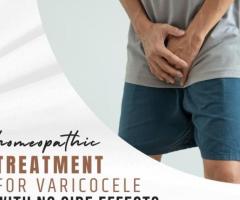Varicoceles are caused by the expansion of veins located in the scrotum. It is a common condition that affects many males, causing them discomfort and fertility problems. Non-surgical treatments such as homeopathy medicine have received attention because of their potential efficacy. In this comprehensive guide, we explore the symptoms of varicocele, its diagnosis, and different varicocele treatment without surgery alternatives.
Understanding Varicocele
Varicocele can occur when veins in the male scrotum dilate and enlarge, leading to an accumulation of blood. A condition called varicocele is usually found on the left side of the testicle because of its anatomical design. This condition can also occur in the rig...
Varicoceles are caused by the expansion of veins located in the scrotum. It is a common condition that affects many males, causing them discomfort and fertility problems. Non-surgical treatments such as homeopathy medicine have received attention because of their potential efficacy. In this comprehensive guide, we explore the symptoms of varicocele, its diagnosis, and different varicocele treatment without surgery alternatives.
Understanding Varicocele
Varicocele can occur when veins in the male scrotum dilate and enlarge, leading to an accumulation of blood. A condition called varicocele is usually found on the left side of the testicle because of its anatomical design. This condition can also occur in the right or both testicles.
Varicocele symptoms include:
The scrotum may feel dull or uncomfortable, especially following physical exercise or prolonged standing.
Swelling of the scrotum on the right side.
Testicular atrophy or shrinkage of the affected testicle.
Infertility results from sperm defects or low production.
Diagnosis:
Diagnostic tests for varicocele usually include a combination of a physical examination and imaging. Medical professionals may ask patients to perform a Valsalva Technique (holding their stomachs down as if they were about to have a bowel movement) or palpate their scrotum in order to detect any anomalies. Imaging tests like scrotal sonography can be done to see the veins inside the scrotum and determine the severity of the varicocele.
Non-Surgical Treatment:
Despite being a common varicocele treatment, non-surgical approaches to varicocele treatment are gaining more popularity. This is due to the lower risk for complications and their less invasive nature. Varicocele non surgical treatment methodologies are viable alternatives for surgical treatment. These methods are effective in relieving symptoms and improving testicular and reproductive health without the need for invasive procedures.
Homeopathy is a good example of this. Homeopathic remedies treat varicocele holistically by targeting the underlying factors and stimulating the natural healing mechanisms of the body. Homeopathic medications can be prescribed by a doctor based on symptoms and constitution. However, you should consult a qualified doctor to find out the best way forward based on individual needs and tastes.
Homeopathic Treatments for Varicocele
Grade 3 varicoceles are dilations of the veins of the scrotum that can cause significant discomfort. They may also affect fertility. Varicocele grade 3 homeopathic treatment focuses primarily on reducing symptoms, improving sperm, and preventing complications. A customised homeopathic treatment plan could include a combination tailored to the patient's individual symptoms and overall health.
Varicocele medicine:
The best medicine for varicocele is dependent on the severity and type of symptoms as well as individual constitutions. Homeopathic doctors prescribe medicines after a careful evaluation of the patient’s case and symptoms. A homeopath can provide you with personalised treatment plans as well as aftercare.
Homeopathic treatment aims to restore reproductive health, improve blood circulation and reduce swelling. The principle of "like cures like" is used in the selection of homeopathic medicine for varicocele. Homeopathic medications are effective for varicoceles with symptoms such as heaviness and fullness in the scrotum, along with a bruised feeling. It is most effective when a varicocele is associated with venous congestion and a purple discolouration on the skin.
Homeopathy can also be used to treat varicoceles, which are caused by injury or trauma in the scrotum and manifest symptoms such as tenderness, bruising, and swelling. It can reduce inflammation and promote healing of tissue.
Conclusion:
Varicocele can cause men discomfort and affect their fertility. Although surgical intervention is the conventional method of treatment, there are non-surgical alternatives, such as homeopathic medicine. These options offer safe and efficient ways to manage varicocele. Understanding symptoms diagnosis and selecting the best treatments available can help individuals improve their reproductive and overall health. To receive personalised treatment suggestions and achieve optimal varicocele outcomes, it is vital to consult a qualified healthcare provider.



